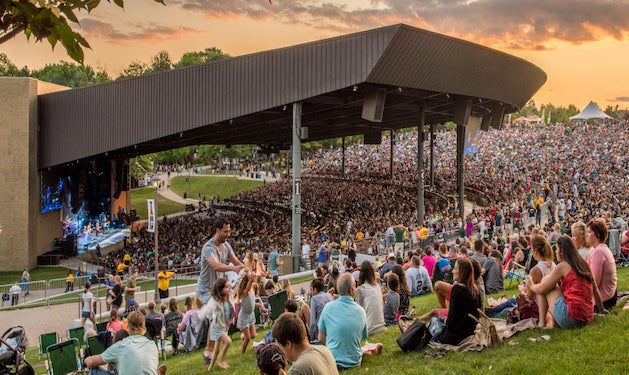Capturing the total absurdity of playing for half a million people on a farm in upstate New York, guitarist and lead singer Alvin Lee of Ten Years After announced the final song in the band’s Woodstock set this way: “This is a thing called “I’m Going Home”…by helicopter.”
Day Three, Performer 3: Ten Years After
Performed Sunday night, August 17, 8:30–9:30 pm
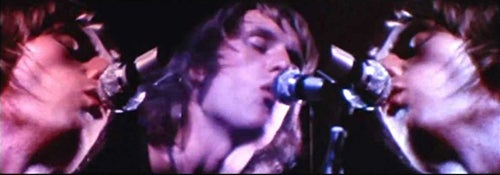
From the 1970 feature documentary, Woodstock, Alvin Lee of Ten Years After in split-screen on the Woodstock stage.
Ten Years After Band Members
- Alvin Lee: guitar, vocals
- Chick Churchill: keyboards
- Leo Lyons: bass
- Ric Lee: drums
Ten Years After Woodstock Setlist:
- Spoonful
- Good Morning Little Schoolgirl (including two false starts)
- Hobbit
- I Can't Keep from Crying Sometimes
- Help Me
- I'm Going Home
Inspired by earthy American blues and early rock and roll records, guitarist Alvin Lee and bassist Leo Lyons began playing shows together around the Nottingham/Mansfield area of northern England in 1960, initially as Ivan Jay and the Jayhawks. This band featured rhythm guitarist Ray Cooper and drummer David Quickmire and was fronted by vocalist Ivan Jay, who left the band along with Ray Cooper in 1962. Following Jay’s departure, Alvin Lee assumed vocal duties and the band continued to perform as The Jaybirds.
David Quickmire left the band in 1965 and was replaced by Ric Lee (no relation to Alvin). Trimmed down to a three-piece, The Jayhawks migrated to London and got a gig working as the backup band for the British vocal trio The Ivy League. Not long after this stint, the band expanded to a four-piece with the addition of keyboardist Chick Churchill. In short order, the group attracted the attention of a manager in the form of Chris Wright, who with his business partner Terry Ellis would go on to form the Chrysalis management agency and later the Chrysalis Records label. Now sporting an edgy blues sound, the band gigged around London using the names Blues Trip and Blues Yard before settling on Ten Years After, a name chosen in honor of 1966 being the 10th anniversary of Elvis Presley’s commercial breakout year.
By 1967, Ten Years After was melting audiences with a residency at London’s prestigious Marquee Club, during which time they honed their loud and aggressive performance style. In August 1967 the group played at the Windsor Jazz Festival and were so ecstatically received that they were offered a contract with Deram Records, a subsidiary of the British Decca label. Without so much as an initial single release, the band recorded their first self-titled album in September 1967, which was rush-released by Deram in October. The album mixed blues standards like “Spoonful” and “Help Me” with bluesy Alvin Lee originals and sold well enough to gain the band a larger profile in their native country.
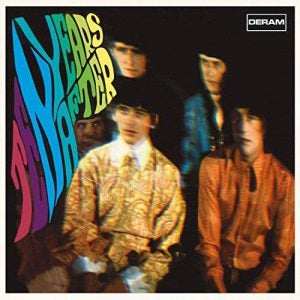
mixed old blues covers and Alvin Lee originals
The band toured internationally for the first time in 1968, with tours of Europe and the United States. A second album, Undead, was released in August of that year. This live album, recorded during a club show in London in May, continued the pattern set by the first album and included Alvin’s Lee’s closing showstopper “I’m Going Home.” After yet more relentless touring, the band was able to record their third album, Stonedhenge, which was issued in February 1969. This was the first Ten Years After album to be largely self-written, with contributions from Leo Lyons and Chick Churchill in addition to more Alvin Lee originals. This album peaked at #61 in the U.S. charts, which was Ten Years After’s highest chart placement to date.
Ten Years After was busy in the summer of 1969. In addition to recording their fourth album, Ssssh. (which was entirely written by Alvin Lee apart from a cover of Sonny Boy Williamson’s classic “Good Morning Little Schoolgirl”), they were among the first rock groups invited perform at the Newport Jazz Festival. They played the Seattle Pop Festival in July, followed by their career-defining appearance in August at Woodstock.
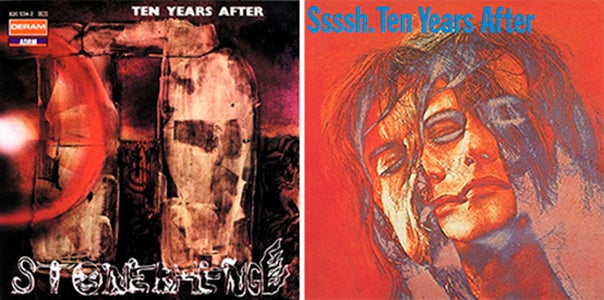
to grow Ten Years After's fan base
With the sky deepening into darkness, Ten Years After hit the Woodstock stage around 8:30 pm. Of all the acts that played at Woodstock, it would seem that Ten Years After most obviously earned their purple heart, delivering a set that was absolutely dogged by technical issues. They opened with a tune they had covered on their 1967 self-titled debut album, Willie Dixon’s (by way of Howlin’ Wolf, by way of Cream) “Spoonful.” The band attempted to establish a groove despite electric shocks from the rainwater that had soaked their equipment and serious tuning issues from the humidity. The next number, a cover of Sonny Boy Williamson’s “Good Morning Little Schoolgirl” (recently covered on their fourth album Ssssh.), was even worse. The band stopped the song twice to retune and never really got fully on track with it.
Retreating into safer territory, the band got some momentum going with “Hobbit,” an instrumental vehicle for a muscular workout from drummer Ric Lee (who also composed it). Another cover followed with a version of the popular Blues Project number (written by organist Al Kooper) “I Can’t Keep From Crying, Sometimes.” Starting off as a standard slow blues number, the song took off into a showcase for some serious guitar mangling from Alvin Lee, including the unique application of a drumstick to his strings. This fired up the crowd, and at last the band was on a good footing. The band kept up the pace with a hot version of another Sonny Boy Williamson (actually Sonny Boy Williamson II, the second musician to use that hallowed name) standard, “Help Me.” Both of these songs were longtime staples of the Ten Years After repertoire, having been recorded for their debut album.
Ten Years After’s Woodstock set came to a close with the fan favorite “I’m Going Home,” an Alvin Lee original released on the 1968 live album, Undead. Alvin Lee’s workout defined the term hot, as he frenetically burned up the fretboard for ten minutes with some of the highest-octane music delivered at the festival. He included a long breakdown section in the middle of the song, drifting into snatches of old rock and roll standards like Carl Perkins’ “Blue Suede Shoes” and Jerry Lee Lewis’ “Whole Lotta Shakin’ Going On.” The crowd went ballistic at the end of this, baying for an encore that Ten Years After did not play. Alvin Lee walked off the Woodstock stage with his band having pulled off a legendary performance despite the odds, and he was even given a celebratory watermelon to take with him.
Woodstock raised the profile of Ten Years After dramatically (two albums reached #20 in the U.S. charts), and the band was further buoyed by the inclusion of “I’m Going Home” in Michael Wadleigh’s festival documentary film and its accompanying soundtrack album. More successful albums followed with 1970s Cricklewood Green and Watt, the latter being the last album the band would record for Deram Records. The band switched record labels in 1971, with Columbia Records releasing A Space in Time, which featured their biggest hit, “I’d Love To Change The World,” which received substantial radio play.
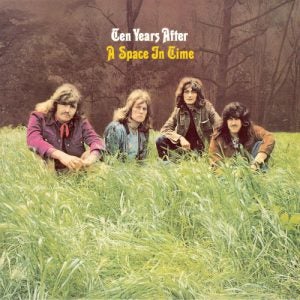
(Chrysalis, 1971) featured their
best-selling single, "I'd Love to Change the World."
Ten Years After released two more studio albums (Rock & Roll Music To The World and Positive Vibrations) and a live album (Recorded Live) before breaking up in 1974 due to dwindling commercial success and being typecast as the band that played “I’m Going Home” at Woodstock. They reunited for the Reading Festival in 1983 and again in 1988, during which they recorded their only reunion album, About Time. They continued to tour until Alvin Lee was replaced in 2003 by guitarist Joe Gooch. Alvin Lee continued to play and record on his own until his death in 2013 following surgery to correct an irregular heartbeat. Bassist Leo Lyons left in 2014, and Ten Years After continues to tour today with Ric Lee and Chick Churchill as the only original members remaining.
—Wade Lawrence & Scott Parker
